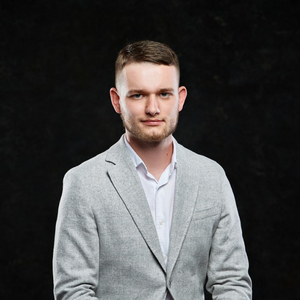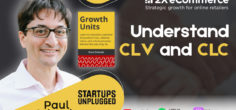Podcast
Learn from Fast Growing 7-8 Figure Online Retailers and eCommerce Experts
🇺🇦 Ukraine: How the eCommerce Industry Can Help
In today’s episode, Kunle is joined by Paul Okhrem, Founder of ELogic Commerce, a Ukraine-based company that services omnichannel brands to deliver eCommerce solutions to serve different markets.
A sudden change in a nation can disrupt any industry and eCommerce is no exception. As the east of Ukraine plunges into chaos, a western Ukraine-based business that focuses on growing their client’s eCommerce brand to make more revenue decided to defy their country’s situation.
ELogic Commerce opened its doors to provide job vacancies to those who lost their livelihood due to the effects of war. They also offered relocation packages to those who decided to flee from the war-torn area and live in safety.
In this episode, Kunle and Paul talk about the status of the war in Ukraine. You will get to hear about how his company continues its operations despite the chaos happening outside their doorstep. This is a great episode for eCommerce entrepreneurs looking for ways to keep the industry going despite challenges.
Here is a summary of some of the noteworthy points made:
- ELogic opens its doors to those who are willing to relocate
- During dire times, leadership is valued by those who follow you both remotely and beside you.
- Internet and communication stability can keep a company going despite the chaos.
- ELogic works with global brands and provides them with quality solutions
Covered Topics:
In today’s interview Kunle and Paul discuss:
- Paul’s Past
- The Structure of ELogic
- The Status of Ukraine in the West
- Internet and Communication Stability
- ELogic Providing Job Vacancies
- ELogic’s Clientele
- Supporting Ukraine
- Paul’s Message to the Audience and Ways to Contact Him
Timestamps:
- 07:29 – Paul’s Past:
- Founding ELogic
- The purpose of ELogic
- 09:00 – The Structure of ELogic:
- ELogic’s staff numbers
- Leading a team that is both office-based and remote
- The effects of the Ukraine-Russia War
- 10:15 – The Status of Ukraine in the West:
- The refugee numbers coming from eastern Ukraine
- Businesses relocating to the west side
- Staying calm amidst the chaos and prioritizing the safety of the staff
- 14:56 – Internet and Communication Stability:
- Elon Musk and Starlink
- Safety of the internet cables installed in Ukraine
- 17:43 – ELogic Providing Vacancies:
- Offering relocation packages
- Expanding to Romania and Poland for the safety of both customers and employees
- 20:17 – ELogic’s Clientele:
- Receiving support from customers
- ELogic strives for detailed solutions to present to their clients
- 22:42 – Supporting Ukraine:
- Finding product markets in Ukraine
- Support channels to reach out to help the people
- Business competitors are partners in dire times
- Ways to advocate around the world
- 27:46 – Paul’s Message to the Audience and Ways to Contact Him
Takeaways:
- Any predicament can make competitors your partners
- To continue supporting your country, one must keep their business going
Links & Resources
- ELogic Commerce
- Paul@ELogic.com
- Paul on LinkedIn
Facebook Group • Continue the Conversation
The eCommerce GrowthAccelerator Mastermind Facebook Group has just launched.
It is a community…
✔️ for founders and experts passionately involved in eCommerce
✔️ for the truly ambitious wanting to make an impact in the markets they serve
✔️ for those willing and open to help and share with other members
Here is where to apply to join the Facebook group
>>http://bit.ly/ecommercefb<<
Transcript
In this episode, you’re going to be reading about an eCommerce agency founder with 200 employees living in Ukraine. It’s an episode you do not want to miss. It’s an episode I want you to read.
—
Typically, I’ll go to my normal blurb where I talk about the fact that we’re here to essentially help you grow and bring all the experts around to help you grow. That’s what I do in this podcast. I’ve set this podcast up to give you one hypothesis to test every week from the people who come in this podcast that would directly impact your growth. The thesis of this podcast is about eCommerce growth through marketing and other aspects of your business. That’s what we turn up every Thursday to do.
I’ll do you guys injustice, I’ll be ignorant to ignore the fact that the world’s not rosy out there. I live in the UK, in England. In Europe, there is a war. There is an invasion in Ukraine. I’ve had the opportunity to bring in someone in our eCommerce industry. He’s doing big things like running a company with 200 plus employees and 150 engineers working in eCommerce, in the Magento space, in the BigCommerce space, in the Shopify Plus space for their clients from Ukraine, predominantly affected by the war. That’s what you’re going to read about. It’s not a typical growth.
I would love for you to read the entire episode because my guest, Paul Okhrem, is going to provide you with ideas and ways you can help. He’s running an eCommerce agency that’s defiant to what is going on. Luckily, they’re based in cities on the West Coast of Ukraine. They’re not affected but what they’re doing is they’ve created new vacancies for their colleagues in the East who’ve lost their jobs and livelihood to join their company in the West.
Most importantly, they’re still getting support from their clients and they’re being defiant about what is going on. I don’t know how brave I could be if I know that I have the option to leave my country in the midst of war. I don’t know how bold I will be. These guys are walking through the whole time with whatever is going on out there.
I implore you to read this from beginning to end. It’s not something we normally would do but it is important that we gauge, understand, and respect their plight. I cannot lie that, over the last couple of weeks, I haven’t had nightmares of potential worst consequences. These realities are real. While we’re here, we fight.
That’s all I want to say for now. Enjoy this episode. I don’t know whether you’re going to enjoy it. What I’d like you to do at the end of the episode is make a decision in any single way you can. It’s not a long conversation. It’s about twenty minutes. I’ll catch you on the next show. This is an impromptu show but it is necessary. All the best. Thank you.
—
Paul, welcome to the 2x eCommerce podcast. These are challenging times, I have to say. We could have had this conversation in the best of times but there’s a reason for everything. You’re the Founder of ELogic Commerce and you have delivery centers for omnichannel brands and eCommerce brands. You service the eCommerce Industry, particularly in the Magento platform, BigCommerce, and Shopify Plus from Ukraine. Do you want to give a bit of an introduction about yourself and ELogic for now and we’ll move on to what you’re experiencing down there?
Sure. I’ve been doing eCommerce for my whole professional life. It’s been more than ten years that I’ve been in the business. I’m the Founder of ELogic Commerce. We help omnichannel brands to deliver eCommerce solutions to serve different markets. We’re focused on growing eCommerce for our partners, which means that we are not only about building stuff, we’re about helping people to make more revenue.
We’re an eCommerce agency in Ukraine and even the Magento platform was engineered in Ukraine so they had an office prior to being acquired by Adobe. The platform started here. It’s the result of the eCommerce business that was delivered here and that is produced here. It’s important to update your audience on the situation so they can have a bigger picture of how the eCommerce agency business works here, how do we feel, and what is the situation of the people who are here on the ground.
To break down how you’re structured, how many employees do you have?
We have more than 150 engineers and 20 managerial staff, which means that we have business analysis teams, we have project management teams, and DevOps teams, which are not related to delivery concurrently.
You’re predominantly in Western Ukraine to be specific. You’re dialing in from Chernivtsi.
We have offices but most of our managerial team is located in Europe and Estonia, Tallinn. For myself, since I was born in Ukraine, I’m often here. Since we have a lot of staff here, it’s pretty important when this time happens that you’re on the ground with the team and you show them your support. Sometimes you make tough decisions.
Leading forward is the key thing. In Ukraine, you’re in three cities in the southwest. You’re closer to the border of Romania, Mordovia, Hungary, and Slovakia. I hear the west is relatively calmer to the eastern and center of Ukraine. Has the army progressed? Has there been any fighting or any attacks on your side of the country?
Historically, the western part of the country is closer to Europe mentally and geographically. That’s why it’s not smart for their army to come here because there are a lot of fighting people, aggressive people who don’t like their country who are politically far from them. That’s why the attack was focused on the eastern borders of the country and the central part. Here, we feel that there are a lot of refugees coming from different parts of the country.
The official statistics prior to our conversation say that, for example, the city where I’m located right now, for the past few weeks, got 80,000 people more. It’s a similar situation to all the other cities in the western part of the country. We get a lot of requests from friends coming from Kyiv or Kharkiv to find apartments for them. We get a lot of requests from our competitors on the labor market to help them to rent offices. We get a lot of requests from people who are closer than we are to the danger to relocate here. We relocated our staff here to make them safer.
You’re in Chernivtsi and you also have two office centers in Ternopil, which is North West from you, and Khmelnytskyi, which is in the North East but they’re all western. We’re doing this episode on Friday, the 11th of March 2022. It was the 24th of February when the invasion started. You guys are in the thick of things from an eCommerce delivery standpoint. What happened? What did you do? How was it received? Was staff stranded anywhere? How did you get everything on board? Did people get deployed? Did people decide to join the army? How have you managed the whole chaos in the country and managed it in a state of calm because you sound calm right now?
We weren’t calm on February 24th, 2022. Even the official statement to our partners, even though we’re connected every day, came a week from that period. On February 24th, 2022, we faced a scenario that was hard to predict or even planned for. Our management team had to respond immediately and our top priority at the time was the safety of our staff and performance as it can be.
When you hear news about the war, you’re not productive but still, you have the plan need to do. For example, some of our team members were closer than we might have imagined. They’ve turned their home basements into offices. They were joining work calls while moving their families abroad and they stayed there offering their support, hope, and homes to people who are moving from other regions. We had a few people who were remote and they were moving quickly to Chernivtsi in safer places.
That’s insane, getting into your basement and saying, “I’m going to work.” What about the internet? I hear Elon Musk was putting a Starlink in Ukraine quite rapidly. How are you guys connected to the internet? What about power and utilities? The West is relatively safe but what about employees in affected areas?
The first thing I did after it got a bit calmer was to call my friend who is a network engineer and knows about all the networks in the country. Most of the cables are located under the ground and it’s 1.5 meters under the level of the ground. To destroy the connection, you need to get a missile to hit the ground at the point where the cable is located okay. It’s a bit decentralized because magistral cables are coming from Europe and other parts.
Elon Musk supported us and the first part of Starlink was sent to the army so they can connect with each other. They even developed a connector to a cigar plug in the car so the army can connect with each other so it’s important for communication. We bought Starlink to provide the pickup channels to our offices. We understand that our offices are a good shelter as well because we were always renting these spaces, which are in the modern areas, safe areas, and they have basements. They have good infrastructure so some people are still working from the office and others are remote. As for the internet, it’s pretty good.
When we talk about electricity, gas, and all this stuff, it’s perfectly well here. We get no disruptions at all. In the eastern part, we have to chat up developers and local developers who are communicating. There are some people who stay in their homes while the missiles are hitting Kharkiv for example. The case for our people, they were fortunate but there are less fortunate people. We understand that our main mission here is not to stay safe but also to help people who lost their jobs because their companies were destroyed. That’s also important.
You’re extending vacancies to these people who’ve lost their means of living particularly in the east, those who’ve been affected.
We offered them relocation packages to move to cities where we have offices. We have rooms in our offices that now serve as a place for refugees to stay because it gets harder to rent an apartment, especially when you have a lot of people from different parts of the country come here. We help those who want to relocate their families to make them safer.
One of the strongest ways to support yourselves is to continue to do business, even more business with yourselves. Be defiant, saying, “Yes, we know what’s happening in Ukraine but we’re going to continue to support Ukrainian businesses.” They’re businesses like yourselves that have been around for over a decade delivering incessantly and professionally for companies around the world.
There are two things that are important, the economical safety and the personal safety of our team. Personal safety means that our team should be safe and our offices should be located in a safe place. We should serve the people who are willing to relocate. The second part is we understand that the economy shouldn’t stop at that. When we pay taxes, we support the army, the country, and the people and their families, which is more important in this scenario.
When we had the managerial virtual team meeting, we were defiant that we will continue our operations here. We won’t stop our hiring processes. We’ll continue to support the country because our roots come from here and we understand that helps the country. On the second hand, we understand that we’ll also expand our Romanian and Polish offices to make sure that our customers feel safe. We should keep our people safe, other people safe, and customers safe. That leads to where we are.
It also boils down to your existing clients or customers. Who are your clients? Would you mind sharing a few of your clients and what was their reaction and their support to you, thus far?
We work with global brands that are midsize to enterprise level. In most cases, they’re B2B and B2C brands. Some of them are B2B2C eCommerce brands. We’re 100% focused on eCommerce agencies. We don’t do things other than eCommerce. The most popular areas where we serve are fashion, consumer electronics, wholesale, B2B, marketplaces, and consumer goods as well. That’s where we have customers.
We work with companies like Benum, which is the largest audio equipment distributor in Nordics and a big company from Switzerland. We have Hanes Brands, which is a big public company. They serve across North America, Australia, and other brands. We work with some of the biggest consulting companies in the world. For example, we have common projects with Accenture, which is the biggest consulting company in the world. There are a number of them.
Also, we’re the global partner of Adobe. We won a lot of awards and recognition from Adobe as well because of what we do. You’ve probably heard about the company called Zyxel, which is the biggest distributor. We have a project with them and some other Fortune companies who come to us for consultants. When they reach out to us, we don’t do the estimate of the project, we think of the solution that will help them to grow. When we do the presentation with the customer, we provide them with the solution and our vision of how they can evolve. We implement this vision into reality, which leads to long-term cooperation. We’re not interested in brands that are willing to do the shop. We’re looking to grow together.
It’s the entire process of helping from a business analysis or project management and implementation standpoint. It’s your software with your strong army of developers.
Those are two pillars because Eastern European talent is exceptional. It’s been historical.
I know a couple of even startups outside of eCommerce that did their prototype, found a product-market fit with Ukrainian teams. When they then got their seed investment or their Series A investment, they then went on to build more local teams but still had the connection with their Ukrainian development houses, because of the expertise of the people.
Magento was founded in Ukraine. They grew delivery centers of 500 engineers in Kyiv, prior to getting acquired by Adobe.
I also know an industry. A friend of mine, Nick Shackelford, is more into performance marketing and I do know for sure that some of the media buyers for his company come from Kyiv. He does conferences even in Kyiv. It’s vitally important that we support you all at this time. My question is, how can we support you, the Ukrainian people, as well as the eCommerce, the tech ecosystem in Ukraine from wherever we are in the world?
There are a few ways to support Ukrainian people and Ukrainian companies. The first one is that you should know that there are safe areas where people still work. There are a lot of places where the conflict is worse, for example, Israel, but there are a lot of fantastic tech companies in Israel. First of all, have a delivery partner that works well. It means that you’re safe and you can continue to work with them.
The second thing is you can always support our army and armed forces. There are a lot of official channels that allow you to do this. Also, the humanitarian and Red Cross aid for people that are less fortunate because they need support for the most essential goods for living like water, food, and clothes. Those are the important areas of support. Fortunately, there are competitors of ours that are in Kharkiv and Kyiv, and even ourselves. We’re not competitors in this situation, we’re partners so we will try to support them as we can.
In terms of lobbying our government, is there anything we need to do or any way we can advocate further from here? I’m in the UK.
It’s important to talk to public people to make sure that they help in terms of helping our armed forces’ weapons, which are important because we can defend our country as long as we have military and defense support.
It’s down to defending and all.
We’re not the people that are attacking someone, we’re defending ourselves.
I want to wish you the best of safety. I hope this podcast makes its rounds, particularly in the eCommerce ecosystem. We’ll push it as much as we can. I don’t know what to say because you’re a brave leader and you’re in a unique situation there. For me, it’s to ensure that we support you economically. You guys have the expertise. You’ve always done it to be defiant against all that’s happening. That’s my take. That’s it. Do you have any final words to say to the audience?
First of all, I want to thank all the audience who read this episode and support your brand because it’s important for the Ukrainian people. I want to thank you as a podcast because you’re doing this. It also supports the country. I want to support our people because it’s a unique situation where people are doing their job, despite the war outside. Even though they’re not fighting, after their shifts people are doing volunteering jobs. They’re donating to the army and it can’t make me any prouder of the team. From my end, I’ll make sure that they’re safe and everyone is safe. As long as I’m here, I’ll make sure that we will continue for our customers because they’re also brave, they support us.
For those who have read and want to reach out to you urgently, what is the easiest and fastest way to reach out to you?
You can email me at Paul@ELogic.com or find me on LinkedIn.
It’s been a pleasure having you. You’re the Founder of ELogic Commerce based out in Ukraine in the front out there. I wish you the best.
Thank you very much. I hope that when the war finishes, we can do a podcast about practical knowledge and all this stuff. Unfortunately, right now we’re fighting and we’ll win this fight for ourselves and the whole of Europe.
Best of luck. Cheers. Bye.
Cheers. Bye.






